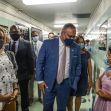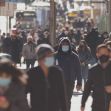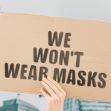Seven Virginia school districts, accounting for more than 350,000 students in the state, have sued incoming Governor Glenn Youngkin over an executive order banning mask mandates across the state in public schools.
Youngkin took office on January 15, 2022, and signed into law eleven executive orders on his first day of office. The second order was a ban on mask mandates in public schools, handing the power of whether a student wears a mask to the parent, rather than the local school district.
The executive order gives parents the full authority to “elect for their children not to be subject to any mask mandate in effect at the child’s school or education program.” The order also bans schools from requiring parents to supply a reason for not masking up or to provide a certification of the health of their child.
A statement released by the coalition of school districts suing the state notes that the lawsuit “defends the right of school boards to enact policy at the local level” and begs the question of whether an executive order “can unilaterally override” the authority of a local school board to protect the health and safety of its students. They also stated that the action “is not politically motivated” but solely based on the health and safety of parents, students, and teachers.
Before leaving office, former Virginia Governor Ralph Northam stated that banning a mask mandate in schools could be a violation of a Virginia state law, Senate Bill 1303 signed earlier last year. That law requires “availability of virtual and in-person learning to all students” and requires each school board to devise a plan to adhere “to the maximum extent practicable” to all mitigation strategies outlined by the Center for Disease Control and Prevention (CDC).
Early last year, the CDC “recommend universal indoor masking by all students (ages 2 years and older), staff, teachers, and visitors to K-12 schools, regardless of vaccination status.” Northam’s staff warned the incoming Governor’s administration that lawsuits would likely be filed should he proceed to ban mask mandates in schools.
Executive Order 2, “Reaffirming the rights of parents in the upbringing, education and care of their children” also received attention from parents unhappy with the change in policy. Prior to the lawsuit filed by the Virginia school boards, parents of students in Chesapeake, Virginia also filed a lawsuit to block the new ban on mask mandates. The lawsuit filed by the parents of these public students claims that the executive order is in direct contradiction of the separation of powers clause of the state’s constitution.
The federal government has the authority to “enforce such regulations… as necessary to prevent the introduction, transmission, or spread of communicable diseases” under Section 361 of the Public Health Service Act. The difficulty here is how this law is interpreted. Those who favor a broader reading see this to allow for the Secretary of Health and Human Services and therefore the CDC, the authority to mandate masks nationwide. However, a narrower reading of the subsections of the law is more in line with historical interpretations, which limits the federal government’s authority to require or enforce health measures to mitigate the spread of a communicable disease.
States are better equipped to enforce a mask mandate than the federal government. State and local authorities can harness their law enforcement infrastructure to monitor and enforce the policy. The federal government usually has to rely on its indirect authority to influence State policy through the Spending Clause and the Commerce Clause of the U.S. Constitution.
This analysis, however, doesn’t answer the question of whether local school boards or the state have the power to implement or ban mask mandates in schools.
Charlottesville, Albemarle County, and Fluvanna County schools of Virginia voted to keep the mask mandates in place at schools. The superintendent of the Catholic Diocese of Arlington published a statement in support of the governor’s executive order and instructed their schools to follow the order, stating “the governor’s executive order is clear on the right of parents not to have their child be subject to a mask mandate.”






